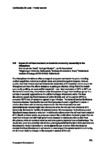Use este identificador para citar ou linkar para este item:
http://www.alice.cnptia.embrapa.br/alice/handle/doc/1036705| Título: | Impact of soil heat treatment on bacterial community reassembly in the rhizosphere. |
| Autoria: | VOORT, M.  MENDES, R.   RAAIJMAKERS, J. M.   |
| Afiliação: | M. VOORT, Wageningen University, Netherlands; RODRIGO MENDES, CNPMA; J. M. RAAIJMAKERS, Netherlands lnstitute of Ecology (N/00-KNA IN), Netherlands. |
| Ano de publicação: | 2015 |
| Referência: | In: RHIZOSPHERE, 4., 2015, Maastricht. Stretching the interface of life: abstracts. Maastricht: Wageningen University & Research Centre and the Netherlands Institute of Ecology, 2015. Ref. 149. |
| Páginas: | 302 |
| Conteúdo: | The rhizosphere microbiome offers a range of ecosystem services to the plant. Including nutrient acquisition, tolerance to abiotic stress and protection against diseases. Here we studied how heat treatment of soil disturbs the reassembly of the bacterial community in the rhizosphere and how this affects tolerance to pathogen infection. Using PhyloChip-based community profiling, we assessed the impact of 1-hour heat treatments of 50ºC or 80ºC on the bacterial community composition in the rhizosphere of sugar beet seedlings grown in a soil that is naturally suppressive to the soil-borne fungus Rhizoctonia solani. The heat disturbance caused significant increase of alpha diversity and led to a partial (50ºC) or complete (80ºC) loss of protection against fungal infection. The bacterial families Bacillaceae, Comamonadaceae, Paenibacillaceae and Alcaligenaceae showed a significant increase in relative abundance with increasing temperatures. The Pseudomonadaceae and Burkholderiaceae showed higher abundance only when the soil was heat-treated at 80ºC. Conversely, the bacterial families Streptomycetaceae, Micrococcaceae, Solibacteraceae and Mycobacteriaceae showed a reduction in relative abundance when the soil was heat-treated at 80ºC. Based on these results, we propose a reassembly model where bacterial groups that are most heat-tolerant and with high growth rates increase in relative abundance after heat disturbance, while temperature-sensitive and slow growing bacteria have a disadvantage. The results also point to a potential role of slow growing bacterial families from Actinobacteria and Acidobacteria phyla in protection of plants against fungal infection. With this study we showed that heat disturbance in soil results in a rearranged rhizosphere bacterial community, which in turn leads to changes in the ecosystem services of the soil. |
| Thesagro: | Rizosfera Bactéria |
| Palavras-chave: | Soil heat treatment |
| Tipo do material: | Resumo em anais e proceedings |
| Acesso: | openAccess |
| Aparece nas coleções: | Resumo em anais de congresso (CNPMA)  |
Arquivos associados a este item:
| Arquivo | Descrição | Tamanho | Formato | |
|---|---|---|---|---|
| 2015RA069.pdf | 43,53 kB | Adobe PDF |  Visualizar/Abrir |









